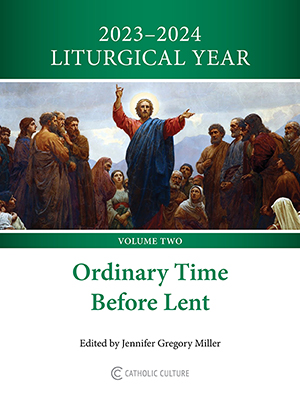Rites and Wrongs
by Phil Lawler
Forty years after John F. Kennedy became the first Catholic elected to the White House, another Democratic senator from Massachusetts finds himself caught up in a controversy over his Catholic faith. But there is a revealing difference between the cases. In 1960, the first JFK sought to neutralize the effects of anti-Catholic prejudice. This year, John F. Kerry seems intent upon exploiting anti-Catholic sentiment to his own political advantage.
Despite repeated admonitions from American bishops (first private, then public), Mr. Kerry insists that he will continue to receive communion when he attends Mass. Thus he puts himself in direct conflict with the Catholic hierarchy, which teaches that the senator's outspoken support for legal abortion renders him unfit to receive the Eucharist. Mr. Kerry may gain a few votes by casting himself as a man of conscience, at odds with bishops whose bungling of a sex-abuse scandal has made them unpopular. But a dispassionate observer—even one who rejects Catholic teachings—should recognize Mr. Kerry's posture for what it is: an assault on the faith he claims to revere.
To grasp the controversy, one must understand the distinctive nature of Catholic doctrine regarding the Eucharist. By sharing in communion, Christians testify that they are in fundamental union of heart and mind; and Mr. Kerry is clearly not in union with the Church on crucial moral teachings. But far more important, Catholics believe that in the Eucharist we receive the greatest of gifts: the body of Jesus Christ. To accept this gift while in a state of serious sin is a scandal to the faithful, a danger to the individual's own soul and, in a public official, a source of confusion for the wider community of believers. The Catholic Church has always taught that abortion is a grave matter, punishable by excommunication. Last year, in an instruction on the duties of Catholic political leaders, the Vatican drew the logical inference, saying that Catholic politicians are morally obligated to oppose legal abortion. (The same is true for euthanasia and same-sex marriage. The church's stance on capital punishment is more nuanced, and political support for the death penalty is not summarily condemned.)
Early this year Archbishop Raymond Burke of St. Louis brought the matter to a head with his announcement that politicians who support abortion should be denied communion. Mr. Kerry shot back with his own announcement that he would continue receiving communion regardless of the prelate's stance.
The policy set forth by Archbishop Burke applies only to the St. Louis archdiocese, which he heads. But every other American bishop has the authority to issue similar orders. The U.S. bishops have set up a committee to discuss possible disciplinary sanctions for Catholic politicians, but individual bishops are under no obligation to wait for guidance from that committee.
In Boston, Mr. Kerry's own spiritual leader, Archbishop Sean O'Malley, has said that the senator—and others who reject church teachings on the dignity of life—should not receive the Eucharist. But he also made it clear that dissident Catholics should not be turned away if they present themselves for communion, as the defiant senator continues to do.
Other American prelates, such as Cardinal Theodore McCarrick in Washington and Archbishop Alfred Hughes in New Orleans, have taken essentially the same position as Archbishop O'Malley, saying that dissenting Catholic leaders should voluntarily abstain from communion but should not be refused if they approach. That attitude seems to perplex Vatican officials. At a news conference last week, Cardinal Francis Arinze, the Vatican's top official for liturgical affairs, was pressed by an American reporter for his opinion on the matter. Without mentioning names, Cardinal Arinze set a clear general rule about Catholics who are not in good standing: "If they should not receive, it should not be given."
This item 5952 digitally provided courtesy of CatholicCulture.org







